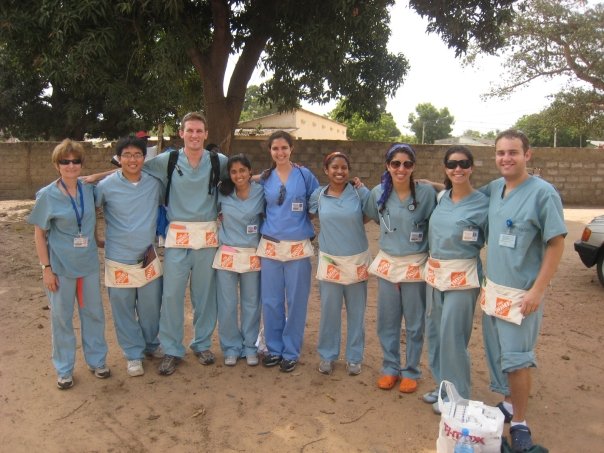
UF medical student, John Martino (center), translator, Sana (right) and a nurse at the Royal Victoria Teaching Hospital in Banjul talk to a mother (not pictured) who's child is suspected of having malaria.
Last summer, seven UF College of Medicine students headed to the Gambia with six suitcases of supplies, ready to volunteer and collect data for a research project. Today, they are working hard to make that experience possible for future classes of medical students.
Last year, Menna Haider, then a first-year medical student, became interested in creating a clinical and research project in the Gambia when she heard about a similar opportunity with the Shands Arts in Medicine program. After checking the feasibility of such a program and putting together a group of interested students, Haider and the new group began to work out the details of their research project and made plans to go to the Gambia.
After months of planning and faculty guidance, second-year medical students Haider, Ryan Gerrity, Archna Eniasivam, Janeen Aladina, John Martino, and Kunjal Gandhi and fourth-year medical student Raj Mehta found themselves in the Gambia. The medical students visited a small village called Kubeneh, a mid-sized hospital in Brikama, and the Royal Victoria Teaching Hospital in Banjul to collect data for their research. Their project focuses mainly on trauma care in the third world and how their triage systems work. They were able to shadow physicians in the hospitals and interact with medical students at the 5-year old medical school at Royal Victoria. They brought supplies everywhere they went, and the people seemed incredibly grateful, Haider said.
The medical students also set up a day clinic in a small village to provide health care and medications to those who came. The students were amazed at how excited the people were to see them.
“We were going to a place that had never seen any medical-related staff whatsoever so there were just a plethora of complaints and issues that we had to deal with,” Gerrity said.
After a month, the seven students returned home, but not without fond memories, new friends and endless data to be analyzed.
Although they intend for this to be an ongoing research project available for future students to continue working on, they have come to some basic conclusions. Most important, unfortunately, is that the Gambia’s triage system is not nearly developed as it is here. The major problem is a lack of records. Prescriptions are written on scraps of paper and records are kept with the patients, not the hospitals.
“They might be trained to deliver care, but they aren’t trained to record everything they need to so that the next person to take care of that patient has all the information they need,” Haider said.
Although the triage system may be a mess, there are some positive aspects of the Gambian health-care system. They have a much better vaccination system than the United States and offer health care at a very low cost, the students say. A trip to the doctor is only $1, and that includes prescriptions and treatments. They also provide free HIV treatment, something that costs thousands in the United States.
In making this a sustainable project, the group wants to work continuously with the contacts they made. The physicians and medical directors are very interested in what the UF medical students will find through their research, and are appreciative of any suggestions for improvement. Haider said the group will give Royal Victoria the data and analysis when it is complete.
After making friends and speaking with medical students at Royal Victoria, a group of Gambian medical students are trying to come to UF next summer for six weeks. Many of the UF students hope to return to the Gambia, as well.
“All of the people were so accepting while we were there,” Haider said. “They still write to us by e-mail and ask us when we are coming back.”

Kunjal Gandhi (left), Janeen Alidina and Archna Eniasivam make origami for the children of Senegal.

